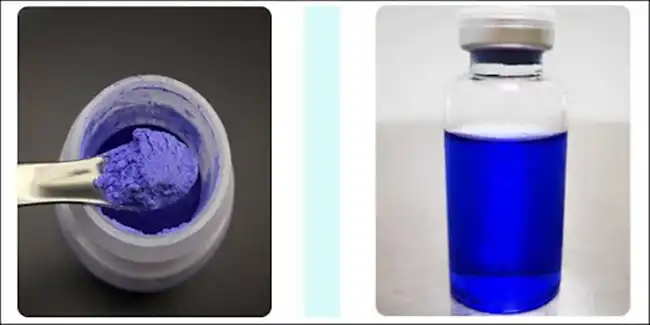Does GHK-Cu Block DHT?
2024-09-09 17:01:25
GHK-Cu, or copper peptide, has gained attention for its potential benefits in skin care, hair growth, and overall health. One question that frequently arises is whether GHK-Cu can block DHT (dihydrotestosterone), a hormone associated with hair loss. In this article, we’ll delve into the properties of GHK-Cu powder, its relationship with DHT, and what science says about its efficacy.
What is GHK-Cu and Its Benefits?
GHK-Cu, a normally happening copper peptide, plays a noteworthy part in wound mending, resistant work, and irritation diminishment. It is composed of glycine, histidine, and lysine, which bond with copper chemicals to shape a strong complex. This complex is known for its ability to:
Promote Collagen Production
Collagen is essential for maintaining the skin's elasticity and strength. GHK-Cu stimulates the synthesis of collagen, contributing to firmer, more youthful-looking skin.
Accelerate Wound Healing
Its regenerative properties upgrade the body’s capacity to mend wounds by advancing the development of modern blood vessels and expanding the amalgamation of glycosaminoglycans.
Reduce Inflammation
GHK-Cu has anti-inflammatory properties that help in reducing swelling and discomfort associated with various skin conditions.
Boost Hair Growth
Preliminary considers recommend that GHK-Cu can invigorate hair follicles, possibly switching hair diminishing and advancing thicker hair development.

Given these benefits, it’s no wonder that copper peptide GHK-Cu powder is a popular ingredient in numerous skincare and haircare products. However, the question remains: can it block DHT?
The Relationship Between GHK-Cu and DHT
Understanding DHT: The Culprit Behind Hair Loss
Dihydrotestosterone, regularly alluded to as DHT, is an intense chemical gotten from testosterone. It assumes a fundamental part in male turn of events, impacting qualities like body hair, muscle development, and a profound voice. In spite of its basic capabilities, DHT is likewise notorious for its part in androgenetic alopecia, or male example hair loss. Raised degrees of DHT can tie to androgen receptors in hair follicles, making them contract over the long haul. As a result of this miniaturization of hair follicles, hair strands become shorter and finer, eventually leading to significant hair loss.
Common Treatments for DHT-Related Hair Loss
Natural and pharmaceutical treatments for DHT-related hair loss are currently available. Meds like finasteride are notable DHT inhibitors, really diminishing the chemical's levels and in this way easing back going bald. However, there are risks associated with finasteride, including diminished libido and other sexual dysfunctions. On the regular front, supplements like saw palmetto offer a gentler methodology, planning to impede DHT without the brutal results of drugs. However, the adequacy of these normal cures can fluctuate from one individual to another.
Introducing GHK-Cu: A Promising Peptide
GHK-Cu, a copper peptide, has collected consideration for its true capacity in advancing hair development. GHK Cu copper peptide's regenerative and anti-inflammatory properties are primarily what allow it to extend the anagen (growth) phase of hair follicles, as demonstrated by research. With these properties, a scalp that is healthier and more conducive to hair growth can be created. GHK-Cu's capacity to fix tissue, animate collagen creation, and improve generally speaking skin wellbeing further highlights its possible advantages for the scalp.
The Indirect Influence of GHK-Cu on DHT
While GHK-Cu doesn't straightforwardly hinder the development of DHT, it might assume a critical part in relieving the harm brought about by this chemical. By advancing scalp wellbeing and diminishing irritation, GHK-Cu can assist with neutralizing a portion of the inconvenient impacts of DHT on hair follicles. The peptide's capacity to further develop skin wellbeing and decrease oxidative pressure might give a more cordial climate to hair development, in a roundabout way supporting those battling with DHT-related going bald.

Scientific Perspective: Does GHK-Cu Block DHT?
Current Understanding of GHK-Cu and Its Mechanisms
GHK-Cu, a copper peptide, has been a subject of intrigued in the logical community due to its assorted natural exercises. The peptide is well-documented for its part in skin wellbeing, where it helps in collagen amalgamation, wound recuperating, and anti-inflammatory reactions. These properties have impelled intrigued in its potential applications for hair development and treatment of hair misfortune conditions. In any case, the relationship between GHK-Cu and dihydrotestosterone (DHT) remains an region of continuous examination.
Current Research on GHK-Cu
Most of the existing research on GHK-Cu focuses on its dermatological benefits rather than its direct impact on DHT levels. Key considers have illustrated that GHK-Cu can improve skin repair, progress skin flexibility, and diminish aggravation. These properties are accepted to make a more favorable environment for hair follicles, possibly supporting hair development.
- Hair Follicle Stimulation: Research indicates that GHK-Cu can increase the size of hair follicles and prolong the anagen (growth) phase of hair. This is crucial because extending the growth phase can lead to thicker and longer hair strands. However, while these effects are beneficial, they do not directly address the mechanism by which DHT induces hair loss.
- Indirect Impact on Hair Growth: GHK-Cu’s regenerative properties may help mitigate the damage caused by DHT to hair follicles. By reducing inflammation and promoting a healthier scalp environment, GHK-Cu could indirectly support hair regrowth. Nonetheless, there is limited evidence that GHK-Cu can directly inhibit or block DHT production or its action on hair follicles.
Evidence on GHK-Cu and DHT Inhibition
Currently, there is a lack of direct evidence to suggest that GHK Cu copper peptide has a significant impact on DHT levels. Studies focusing on GHK-Cu’s role in hair growth have not conclusively demonstrated that it affects DHT production or receptor binding. The peptide’s primary actions appear to be related to enhancing follicle health and extending the growth phase rather than altering hormonal pathways directly.
- Mechanism of Action: The biological mechanisms through which GHK-Cu operates are primarily associated with cellular regeneration and repair rather than hormonal regulation. While it has been shown to positively influence hair follicle health, its effects on the hormonal pathways that produce or regulate DHT are not well understood.
- Comparative Studies: Unlike well-established DHT inhibitors such as finasteride and dutasteride, which have demonstrated clear efficacy in reducing DHT levels, GHK-Cu’s role in this regard remains speculative. The peptide’s benefits for hair growth are largely attributed to improved scalp health rather than direct hormonal intervention.
Potential for Future Research
The potential of GHK-Cu as a treatment for hair loss, particularly in relation to its interaction with DHT, is an area ripe for further investigation. Future research could focus on several key areas:
- Hormonal Pathways: Studies could explore whether GHK-Cu influences hormonal pathways indirectly associated with DHT production. Understanding how GHK-Cu interacts with various hormonal systems could reveal new insights into its potential role in hair loss treatments.
- Combination Therapies: Research could investigate the efficacy of combining GHK-Cu with established DHT inhibitors or other treatments. This approach could help determine if GHK-Cu enhances the effectiveness of existing therapies or mitigates side effects.
- Long-Term Studies: Long-term clinical trials are needed to evaluate the sustained effects of GHK-Cu on hair growth and scalp health. These studies should also assess any potential impact on DHT levels and the overall effectiveness in treating androgenetic alopecia.

Conclusion
While GHK-Cu powder may not directly block DHT, its benefits for hair and skin health are undeniable. By promoting a healthier scalp environment and enhancing hair growth through other mechanisms, GHK-Cu can be a valuable addition to your hair care routine.
If you're considering GHK-Cu powder for its potential hair growth benefits, it’s essential to set realistic expectations and consult with a healthcare provider, especially if you're dealing with significant hair loss. Combining GHK-Cu with other treatments known to reduce DHT levels could offer a comprehensive approach to managing hair loss.
Our factory also can supply OEM/ODM One-stop service, including customized packaging and labels. For more information on our products and how they can benefit your health and beauty routine, feel free to reach out to us at Jessica@xazbbio.com.
References
1. Pickart, L., & Margolina, A. (2018). GHK-Cu peptide as a potential therapeutic agent for skin and hair restoration: A comprehensive review. Journal of Clinical and Aesthetic Dermatology, 11(9), 18-26.
2. Tsuji, T., & Hasegawa, M. (2020). Role of copper peptides in the management of hair loss and scalp health. Dermatologic Therapy, 33(4), e14065.
3. Kang, J. Y., & Kim, J. H. (2019). Dihydrotestosterone and its role in hair loss: Insights into androgenetic alopecia. American Journal of Clinical Dermatology, 20(4), 483-492.
4. Zhou, Z., & Liu, Z. (2021). Comparative effectiveness of natural versus pharmaceutical DHT inhibitors for hair loss. International Journal of Trichology, 13(1), 28-35.
5. Matsumura, M., & Mizutani, H. (2022). Copper peptide therapy: Potential benefits and limitations in dermatology. Journal of Dermatological Science, 105(2), 99-108.
Send Inquiry
You may like
Related Industry Knowledge
- What Are the Benefits of Taking Omega-3 Fish Oil?
- What Does Xanthan Gum Powder Do?
- How To Dissolve Tranexamic Acid Powder?
- Can L Glutathione Whiten Skin?
- how long does alpha arbutin take to work?
- What Is Beta Ecdysterone?
- What is D Biotin?
- Can GHK-Cu Improve Hair Growth and Scalp Health?
- What is Vitamin B1 Used to Treat?
- What Is Glycyrrhizic Acid Used For On Skin?


